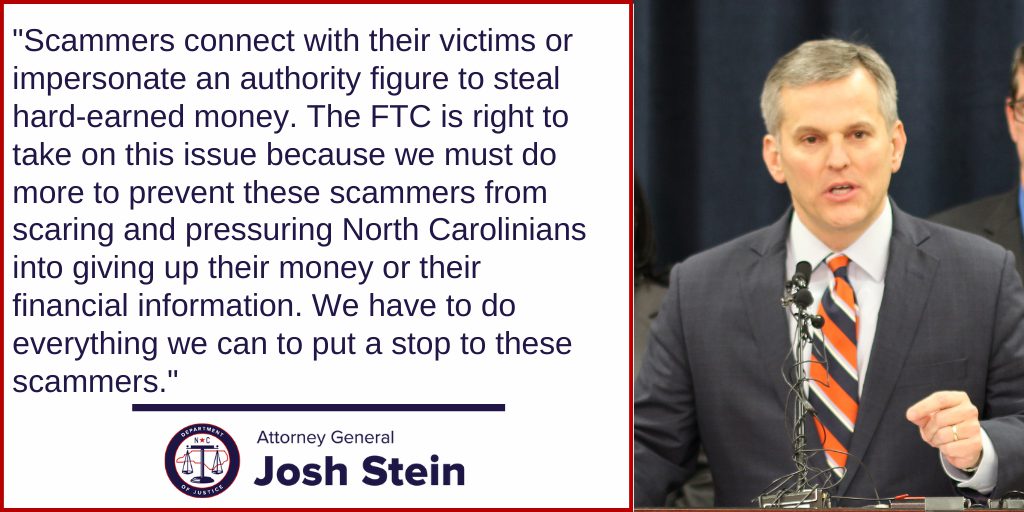
For Immediate Release:
Wednesday, February 23, 2022
Contact:
Nazneen Ahmed (919) 716-0060
(RALEIGH) Attorney General Josh Stein today called on the Federal Trade Commission (FTC) to adopt national protections against impersonation scams, also known as imposter scams. Americans reported more than $2.3 billion in losses caused by imposter scams to the FTC in 2021.
“Scammers connect with their victims or impersonate an authority figure to steal hard-earned money,” said Attorney General Josh Stein. “The FTC is right to take on this issue because we must do more to prevent these scammers from scaring and pressuring North Carolinians into giving up their money or their financial information. We have to do everything we can to put a stop to these scammers.”
Scammers will often impersonate:
- Government agencies to persuade victims that they must pay certain fines or fees to comply with the law and avoid arrest or legal action.
- Businesses, such as Apple or Microsoft, to claim that you have a security or technology issue that needs to be resolved.
- Loved ones and family members to make connections with victims and use their emotions and trust to scam them out of their money.
Though their methods may vary, impersonation scammers take people’s money, drain resources from regulators tasked with protecting the public, and cause confusion and loss of trust in government agencies and services. Attorneys general are the first line of defense against scammers and work to protect people from falling victim to scams and hold accountable scammers.
The attorneys general are asking the FTC to adopt national protections that would:
- Deter bad actors and reduce consumer harm.
- Provide needed clarity on what conduct constitutes impersonation, since government and business impersonation scams can range from overt pretense to misleading subtlety.
- Deprive bad actors of the excuse that they were allegedly not aware their activities were illegal in some jurisdictions as opposed to others.
- Provide more opportunities for the states to collaborate with the FTC on multistate enforcement actions against imposter scammers.
- Allow states to enforce their own standards, free of any preemption by a federal rule.
- Publish additional consumer and business education materials to help prevent people from becoming victims of fraud.
Attorney General Stein was joined in sending this letter by the Attorneys General of Alabama, Alaska, Arizona, Arkansas, Colorado, Connecticut, Delaware, District of Columbia, Florida, Georgia, Guam, Hawaii, Idaho, Iowa, Kansas, Kentucky, Louisiana, Maine, Maryland, Massachusetts, Michigan, Minnesota, Mississippi, Missouri, Montana, Nebraska, Nevada, New Hampshire, New Jersey, New Mexico, New York, North Dakota, Ohio, Oklahoma, Oregon, Pennsylvania, Rhode Island, South Carolina, South Dakota, Tennessee, Texas, Utah, Vermont, Virginia, Washington, West Virginia, Wisconsin, and Wyoming.
A copy of the letter is available here.
###
